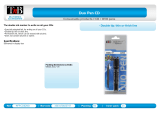
6
En
Con la presente Onkyo Corporation dichiara che
questo LAP-301 è conforme ai requisiti
essenziali ed alle altre disposizioni pertinenti
stabilite dalla direttiva 1999/5/CE.
Ar šo Onkyo Corporation deklarē, ka LAP-301
atbilst Direktīvas 1999/5/EK būtiskajām prasībām
un citiem ar to saistītajiem noteikumiem.
Šiuo Onkyo Corporation deklaruoja, kad šis
LAP-301 atitinka esminius reikalavimus ir kitas
1999/5/EB Direktyvos nuostatas.
A Onkyo Corporation ezzennel kijelenti, hogy a
LAP-301 típusú beren-dezés teljesíti az alapvető
követelményeket és más 1999/5/EK irányelvben
meghatározott vonatkozó rendelkezéseket.
Hierbij verklaart Onkyo Corporation dat het
toestel l LAP-301 in overeenstemming is met de
essentiële eisen en de andere relevante bepalin-
gen van richtlijn 1999/5/EG.
Niniejszym Onkyo Corporation deklaruje że
LAP-301 jest zgodny z zasadniczymi
wymaganiami i innymi właściwymi
postanowieniami Dyrektywy 1999/5/EC.
Eu, Onkyo Corporation, declaro que o LAP-301
cumpre os requisitos essenciais e outras
provisões relevantes da Directiva 1999/5/EC.
Prin prezenta, Onkyo Corporation, declară că
aparatul LAP-301 este în conformitate cu
cerinţele esenţiale şi cu alte prevederi pertinente
ale Directivei 1999/5/CE.
Onkyo Corporation týmto vyhlasuje, že LAP-301
a spĺňa základné požiadavky a všetky príslušné
ustanovenia Smernice 1999/5/ES.
Onkyo Corporation izjavlja, da je ta LAP-301 v
skladu z bistvenimi zahtevami in drugimi
relevantnimi določili direktive 1999/5/ES.
Onkyo Corporation vakuuttaa täten että
LAP-301 tyyppinen laite on direktiivin 1999/5/EY
oleellisten vaatimusten ja sitä koskevien
direktiivin muiden ehtojen mukainen.
Härmed förklarar Onkyo Corporation att denna
LAP-301 följer de väsentliga kraven och andra
relevanta stadgar i Direktiv 1999/5/EC.
Hér með lýsir Onkyo Corporation því yfir að
varan LAP-301 er í samræmi við grunnkröfur og
aðrar kröfur sem gerðar eru í tilskipun
1999/5/EC.
Onkyo Corporation erklærer herved at denne
LAP-301 er i overensstemmelse med vesentlige
krav og andre relevante bestemmelser i direktiv
1999/5/EC.
Speaker Precautions
Placement
• The subwoofer cabinet is made out of wood and is
therefore sensitive to extreme temperatures and
humidity, do not put it in locations subject to direct
sunlight or in humid places, such as near an air
conditioner, humidifier, bathroom, or kitchen.
• Do not put water or other liquids close to the
speakers. If liquid is spilled over the speakers, the
drive units may be damaged.
• Speakers should only be placed on sturdy, flat
surfaces that are free from vibration.
Putting them on uneven or unstable surfaces, where
they may fall and cause damage, will affect the
sound quality.
• Subwoofer is designed to be used in the upright
vertical position only. Do not use it in the
horizontal or tilted position.
• If the unit is used near a turntable, CD player or
DVD player, howling or slipping of sound may
occur. To prevent this, move the unit away from
the turntable, CD player or DVD player, otherwise
lower the unit’s output level.
Use with a TV set
In general, Braun tubes used for color television sets,
etc. are extremely sensitive and can be affected even
by the magnetism of the earth. If a speaker system is
used near them, therefore, discoloring or distortion of
pictures will occur.
These speakers are not provided with magnetic
shielding. If discoloration or distortion occurs, move
the speakers apart from the television set.
Input Signal Warning
The speakers can handle the specified input power
when used for normal music reproduction. If any of
the following signals are fed to them, even if the
input power is within the specified rating, excessive
current may flow in the speaker coils, causing
burning or wire breakage:
1. Interstation noise from an untuned FM radio.
2. Sound from fast-forwarding a cassette tape.
3. High-pitched sounds generated by an oscillator,
electronic musical instrument, and so on.
4. Amplifier oscillation.
5. Special test tones from audio test CDs and so on.
6. Thumps and clicks caused by connecting or
disconnecting audio cables (Always turn off
your amplifier before connecting or
disconnecting cables).
7. Microphone feedback.


























